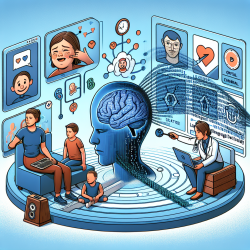The global disparities in access to COVID-19 vaccines have rekindled debates about the human right to medicines and its standing in international law. For practitioners in the field of online therapy, particularly those working with schools, understanding the legal framework and state practices surrounding this right can offer significant insights into improving service delivery and advocating for equitable access to essential medicines.
Key Insights from the Research
The research paper "An Inquiry into State Agreement and Practice on the International Law Status of the Human Right to Medicines" (Forman, Al-Alami, & Fajber, 2022) delves into whether the right to medicines has achieved any binding legality within international law. Here are some critical takeaways that can be instrumental for online therapy practitioners:
- Legal Framework and State Practices:
- The research employs the interpretive framework of the Vienna Convention on the Law of Treaties and the International Law Commission’s 2018 report to analyze the United Nations Committee on Economic, Social, and Cultural Rights (CESCR) work relevant to medicines.
- The findings suggest that successive General Assembly resolutions provide evidence of state agreement that the rights to health and science, as protected in the International Covenant on Economic, Social and Cultural Rights (ICESCR), include access to affordable medicines.
- Implications for Online Therapy:
- Advocacy and Policy: Practitioners can use this legal backing to advocate for better access to medicines and mental health services in schools. Highlighting the state's obligations under international law can be a powerful tool in negotiations with policymakers and educational institutions.
- Resource Allocation: Understanding these legal frameworks can help practitioners better allocate resources and seek funding or partnerships that prioritize access to essential medicines, especially in underserved communities.
- Education and Training: Incorporating knowledge about the human right to medicines into training programs for therapists can improve their ability to navigate and address the complexities of access to care.
Encouraging Further Research
The paper also emphasizes the ongoing political opposition that may continue to undercut the emerging legal norm of the right to medicines. This indicates a need for continuous research and advocacy to strengthen this right.
Practical Steps for Practitioners
- Stay Informed: Regularly update your knowledge on international law and state practices regarding the right to medicines.
- Engage in Advocacy: Work with local and international organizations to advocate for policies that ensure equitable access to medicines.
- Collaborate: Partner with schools, healthcare providers, and policymakers to create integrated approaches to mental health and therapy services that consider the legal aspects of medicine access.
To read the original research paper, please follow this link: An Inquiry into State Agreement and Practice on the International Law Status of the Human Right to Medicines.










